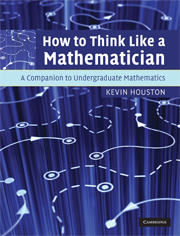Book contents
- Frontmatter
- Contents
- Preface
- I Study skills for mathematicians
- II How to think logically
- III Definitions, theorems and proofs
- IV Techniques of proof
- V Mathematics that all good mathematicians need
- 27 Divisors
- 28 The Euclidean Algorithm
- 29 Modular arithmetic
- 30 Injective, surjective, bijective – and a bit about infinity
- 31 Equivalence relations
- VI Closing remarks
- Appendices
- Index
29 - Modular arithmetic
from V - Mathematics that all good mathematicians need
- Frontmatter
- Contents
- Preface
- I Study skills for mathematicians
- II How to think logically
- III Definitions, theorems and proofs
- IV Techniques of proof
- V Mathematics that all good mathematicians need
- 27 Divisors
- 28 The Euclidean Algorithm
- 29 Modular arithmetic
- 30 Injective, surjective, bijective – and a bit about infinity
- 31 Equivalence relations
- VI Closing remarks
- Appendices
- Index
Summary
This is the kind of arithmetic I like.
Chico in The Magnificent SevenWhen I was a student I was not particularly impressed with modular arithmetic. Initially, to me, it seemed like an abstract toy to play with. It didn't look as though it was useful or deep. Now I fully appreciate it as I have seen it used repeatedly, and widely, in real-life applications such as cryptography (which includes internet security), data storage, bar-codes, ISBN details (on the backs of books) and even magic tricks.
The idea of modular arithmetic is very simple. Take a natural number, say n. Then, we consider two integers to be equivalent if their remainders on division by n are equal. For example, take n = 5. Then 22 and 57 are the same because they both have the same remainder, in this case 2, when we divide by 5.
In this chapter we will study some elementary properties of modular arithmetic before moving on to some applications in number theory.
Modular arithmetic
We begin with the definition.
Definition 29.1
If two integers x and y have the same remainder when we divide by a natural number n, then we say that x and y are equivalent modulo n (or x equals y mod n or x equals y modulo n) and write x mod n = y mod n or more briefly x = y mod n.
- Type
- Chapter
- Information
- How to Think Like a MathematicianA Companion to Undergraduate Mathematics, pp. 208 - 217Publisher: Cambridge University PressPrint publication year: 2009



